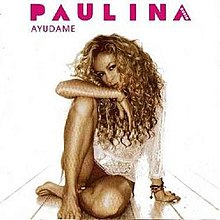
Paulina Susana Rubio Dosamantes is a Mexican singer, songwriter and television personality. Referred to as "The Golden Girl" and "Queen of Latin Pop", she first achieved recognition as a member of the successful pop group Timbiriche from 1982 through 1991. After leaving Timbiriche, she embarked on a solo career. Rubio has sold over 15 million records, making her one of the best-selling Latin music artists of all time.
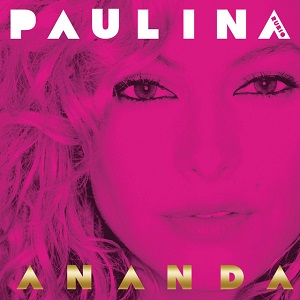
Ananda is the eighth studio album by Mexican singer-songwriter Paulina Rubio, released on September 18, 2006, through Universal Latino. Its pop rock music incorporates latin, dance, folk, electropop, alternative and flamenco styles with instrumentation from synthpop beats, guitars, drums, synthesizers, strings and Spanish musical instruments. Its themes range from love, empowerment, and dancing. Contributions to the album's production came from a wide range of producers, including Cachorro López, Rick Wake, Tricky Stewart, Áureo Baqueiro, TOY Hernández and Gustavo Santaolalla. Among the songwriters and artist collaborators appear on the album are Xabi San Martín from La Oreja de Van Gogh, Slash from Guns N' Roses, Juanes, Julieta Venegas and Coti.

"Ni Una Sola Palabra" is a song by Mexican singer Paulina Rubio from her eighth studio album Ananda (2006). It was released on July 23, 2006, by Universal Latino, as the lead single from the album. The song was written by Xabi San Martín, keyboardist of the Spanish pop band La Oreja de Van Gogh, and was intended to be included in one of the band's albums. Rubio took an interest in the song and recorded it in 2005 at her home studio in Miami, and it was produced by Cachorro López. Musically, "Ni Una Sola Palabra" is a pop rock song with elements from synth-pop, new wave and electronic.
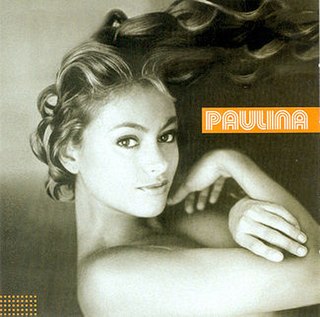
Paulina is the fifth studio album by Mexican singer Paulina Rubio. It was released on May 23, 2000 internationally by Universal Music México, being the first one with the label after departing from EMI México. Rubio worked with writers and producers such as Estéfano (mostly), Chris Rodríguez, Armando Manzanero, Juan Gabriel, Christian De Walden, and Richard Daniel Roman. The album explores a more variety sounds much different to the vein of her albums with EMI Music, and has an overall latin pop and dance-pop vibe, with influences from rock, ranchera, bolero, funk and house. Elaborating a "synthesis of the end of the millennium" theme for the album, Rubio reinvented her image.
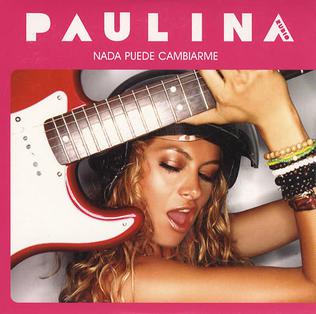
"Nada Puede Cambiarme" is a song recorded by Mexican singer Paulina Rubio, features electric guitar by Guns N' Roses's Slash. It is the second track on Rubio's eighth studio album, Ananda (2006), which was written by Fernando Montesinos, with production from Áureo Baqueiro. The song was released as second single from Ananda on January 18, 2007 by Universal Latino.

Mexican singer-songwriter Paulina Rubio has released eleven studio albums, fifteen compilation albums, 65 singles, ten promotional singles, and has made some eleven guest appearances. In 1992, Rubio signed a recording contract with record label Capitol Latin in order to launch her career as a solo artist, after recording ten albums with Timbiriche between 1982 and 1990.

"Don't Say Goodbye" is a song by Mexican singer Paulina Rubio, taken from her sixth studio album and crossover album, Border Girl (2002). It was written by Joshua "Gen" Rubin and Cheryl Yie and produced by Rubin. "Don't Say Goodbye" is a dance-pop song and talks about rejecting the idea of not saying goodbye to a lover. The song was released through Universal Records on 29 April 2002 as the lead single from the album. In Latin America and France, a Spanish version of the song titled "Si Tú Te Vas" was released, written by Luis Gómez Escolar.

"Te Quise Tanto" is a song by Mexican singer Paulina Rubio from her seventh studio album Pau-Latina (2004). It was released as the lead single from the album by Universal Latino on December 22, 2003. The song was written by Coti Sorokin, Andahí and Adrian Schinoff, and produced by Emilio Estefan Jr.. "The Quise Tanto" is a Latin pop and pop rock song in which Rubio expresses how difficult it is to forget a lover.

"The One You Love" is a song by Mexican singer Paulina Rubio from her sixth studio album, Border Girl (2002). It was written by Brett James and Troy Verges, and produced by Shep Goodman and Kenny Gioia. The song was released as the third US and second international single from Border Girl on August 20, 2002, by Universal Records. A Spanish version titled "Todo Mi Amor", was also recorded and released to the Latin American market.

"Y Yo Sigo Aquí" is a song recorded by Mexican singer Paulina Rubio for her fifth studio album, Paulina (2000). It was released as the third single from the album on November 13, 2000. Also, it was released in January 2001 in the United States and Europe. Jointly written and composed by Estéfano, "Y Yo Sigo Aquí" is a dance pop and Europop song along pulses with a synthesized house and techno beat. It was one of the most successful songs of the year in the world and is recognized as one of Rubio's signature songs.
Amor, Luz Y Sonido Tour or Love, Light & Sound Tour was the thirth concert tour by Mexican singer Paulina Rubio, in support of her eighth studio album, Ananda (2006). The tour began on 23 February 2007 in Lanzarote, Canary Island at the Campo de Fútbol Arrecife and concluded on 30 September 2007 in Córdoba, Argentina at Orfeo Superdomo, consisting of 14 shows in Europe, 31 in United States and 8 shows in Latin America. It is considered her most extensive tour in Spain.

Gran City Pop is the ninth studio album by Mexican singer Paulina Rubio, released by Universal Latino on June 23, 2009. The pop album expanded the Rubio's stylistic palette by combining elements of genres such as rock, ranchera, hip-hop, eurodisco or arena rock, and she became more involved in songwriting and creative elaboration, extracting influences from various dance-pop-based genres including electropop, synth-pop and eighties British pop.

"Ni Rosas Ni Juguetes" is a song recorded by Mexican recording artist Paulina Rubio for her ninth studio album Gran City Pop (2009). It was written by Claudia Brant, Noel Schajris and Gianmarco Zignago, and produced by Cachorro López. Due to popularity, the song was announced as the second single on July 20, 2009, released official worldwide on August 17, 2009 by Universal Music Latin Entertainment. "Ni Rosas Ni Juguetes" is a Latin pop song with ranchera and hip-hop influences. The song's lyrics discusses Rubio's decision to overcome a relationship and her empowerment.

"El Último Adiós" is a song recorded by Mexican singer Paulina Rubio for her fifth studio album Paulina (2000). It was released as the second single from the album on July 17, 2000 by Universal Latino. Rubio co-wrote and co-produced the track with Estéfano, and was originally conceived it as a ranchera-hip-hop-styled song. Lyrically, its a break-up mood.

"Lo Haré Por Ti" is a song recorded by Mexican singer Paulina Rubio for her fifth studio album Paulina (2000). Written by Estefano and produced by Chris Rodriguez, the bolero-influenced pop rock song was then released as the lead single from Paulina on January 11, 2000, through Universal Music Latin, Polydor Records and Muxxic Records. The song marks Rubio's "comeback" single after the dissolution of her contract with EMI in the late 1990s. Lyrically, the song is about a woman who is willing to do anything for the man she loves, with refers to the tangos of the French Argentine artist Carlos Gardel.

"Vive El Verano" is a song by Mexican singer Paulina Rubio from her fifth studio album, Paulina (2000). It was released first as a promotional single on July 4, 1999, by Universal Spain, and then as the fifth single from the album in Europe by Universal Latino, Polydor, Muxxic and Mercury in June 9, 2001. The singer first recorded the vocals for the track in Madrid —which were later re-recorded for the 'album version' of the song— for a television Spanish show by Antena 3 titled of the same name, where Rubio hosted. The Latin pop song was written by Richard Daniel Roman and Ignacio Ballesteros, and was produced by Francisco Pellicer.
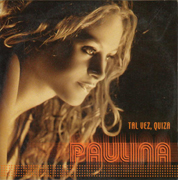
"Tal Vez, Quizá" is a song performed by Mexican singer Paulina Rubio, taken from her fifth studio album Paulina (2000). The song was written by Armando Manzanero, and produced by Marcello Azevedo. Lyrically, the song talks about a woman who asks her lover to stay with her, narrating from her perspective the feelings and emotions of being the second choice in an extramarital affair.

"Me Gustas Tanto" is a song recorded by Mexican singer Paulina Rubio for her tenth studio album, Brava! (2011). It was released by Universal Latino as the lead single from the album on September 2, 2011. The track was written by Rubio, Nacho and Andrés Recio, whilst production was handled by RedOne.

Mexican entertainer Paulina Rubio has released four video albums and has appeared in fifty-four music videos and three guest appearances. From her debut studio album La Chica Dorada (1992), she released music videos for the singles "Mío" and "Amor De Mujer", all directed by Ángel Flores and released from 1992–93. For the first of these, she earned an nomination ERES Award for Best Video. She followed with three other music videos from her second album 24 Kilates (1993): "Nieva, Nieva", "Él Me Engañó" and "Asunto De Dos", directed by Ángel Flores, Daniel Gruener and Tito Lara, respectively. Rubio's third studio album El Tiempo Es Oro (1995) spawned the singles "Te Daría Mi Vida" and "Nada De Ti", whose music videos was directed by Carlos Marcovich. This was followed by Planeta Paulina's videos: "Siempre Tuya Desde La Raíz", a futuristic video with a concept cosmic and 70's dance, "Solo Por Ti", recorded in a barren desert of Mexico, and "Enamorada", which tells the story of gay couple. The three videos was directed by Tito Lara from 1996-1997.

"Tú y Yo" is a duet song by Mexican singers Raymix and Paulina Rubio. It was released through Universal Music on March 20, 2020. The song was written by Rubio, Yasil Marrufo, and Edmundo Gómez Moreno; its producers Raymix and Sheeqo Beat and mixed by Armando Ávila.
